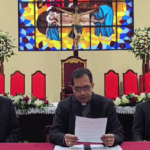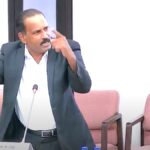There’s a stigma in Bulgarian society about talking about life with an abusive partner. This is just one of the reasons why this eastern European country has such a big problem with gender-based and domestic violence.
According to the Feminist Mobilisations collective, 18 women have been murdered in Bulgaria so far this year.
Feminist Mobilisations is just one of a number of organizations working tirelessly to counter gender-based violence in Bulgaria. Among other things, it organizes information campaigns and demonstrations against violence against women several times a year under the slogan “Not a single woman more.”
Follow The Hashtag: #NiUnaMenos
This slogan was inspired by the Latin American feminist “Ni Una menos” movement, which began in Argentina. The movement’s name, which means “Not one less,” is associated with the phrase “Ni una muerta más” (in Spanish: “Not one dead woman more”) coined by Mexican poet and activist Susana Chavez in 1995 to protest the murders of women in Ciudad Juarez.
‘Not a single woman more!’
When Chavez herself was murdered in 2011, the phrase became a symbol of resistance to violence against women.
The slogan is widely used in Bulgaria now too and is inextricably linked to the fight against gender-based violence in the country.
In the summer of 2023, for example, thousands took to the streets of cities across Bulgaria to show their support for an 18-year-old girl who had been brutally attacked by her ex-partner.
Protesters around the country that day chanted “Not a single woman more!”
Fighting for a world without violence
“There are so many women going through the hell of violence who are in danger, who cannot defend themselves, cannot speak out yet. We want their voices to be heard,” says Shirin Hodzheva, one of the women behind Feminist Mobilisations.
Another is Dessislava Dimitrova. Like many other women in Bulgaria, Dimitrova has experienced domestic violence firsthand. “I couldn’t just stand by, knowing what I went through and what thousands of other women are going through every day. So, I decided to be an active participant in the fight for change. To show as many women as possible that they are not alone: We are here and we are fighting for a world without violence,” she told DW.
The importance of changing archaic mindsets
Nora Hristova is part of the Emprove Foundation, an organization that works with women who have been in traumatic or violent relationships. She joined the foundation’s Women Survivors group, where women who have managed to leave violent relationships help and support other women in similar situations. She calls the group the “heart of the organization.”
Hristova says that it is important for women to have a support system, especially in Bulgarian society, where most people’s views on domestic violence are deeply rooted in an archaic belief system about gender roles in society.
A recent study showed that 48% of Bulgarians believe that “problems inside the family should be dealt with privately” and that 69% believe that there are forms of violence within the family unit that have been normalized in Bulgarian society.
In the words of Dessislava Dimitrova, the indifference resulting from the fact that domestic violence is typically played down or justified is also a problem. “Views such as ‘family problems are solved at home’ often keep victims in violent situations and discourage them from seeking help,” she says.
According to Nora Hristova, the most important thing is for this mindset to change. “The more sensitivity is raised at societal level, the lower the tolerance for violence will be,” she told DW.
The state doesn’t do enough to protect women
A major part of the problem for women in Bulgaria is the inadequate response of state authorities in cases of gender-based violence.
In November, the District Court in Plovdiv ruled that the assailant of 18-year-old Debora, whose case sparked massive protests in 2023, could get out of jail by paying 6,000 leva (around €3,000 or $3,200) in bail. This is why many women in Bulgaria fear that their attackers will not be prosecuted, let alone sentenced.
Another brutal case that shook Bulgarian society in recent years was the case of 33-year-old Evgeniya, who was murdered by her husband and whose body was discarded in a suitcase.
Her father-in-law assisted his son with the killing and subsequently lied to the authorities and the media about it. Even though both men were sentenced to life in prison, the sentence has not yet been finalized — three years after Evgeniya’s murder. Meanwhile the murderer’s father has been released from prison and is under house arrest.
Not only women are affected
Last year, the Bulgarian parliament passed an amendment to the Law for Protection against Domestic Violence, making domestic violence punishable in cases where the perpetrator and the victim are “in an intimate relationship,” which was not previously the case.
As welcome as this is, there are several problems with the definitions involved. For example, a relationship is only considered “intimate” if it is more than 60 days old. Another problem is that the relationship must be between man and woman. In other words, members of the LGBTQ+ community are not protected by the amendment at all.
Indeed, Bulgaria’s ongoing hostile, discriminatory attitude to the LGBTQ+ community is part of the reason the government has refused to sign the Istanbul Convention, the Council of Europe‘s treaty opposing violence against women.
A large group of lawmakers declared their opposition to the convention because they claimed it would “introduce a third gender.” This has been a recurring narrative ever since and has blocked all efforts to make progress on the signing of the convention.
Prevention as the way forward
In light of these problems, prevention is one of the most important issues being addressed by organizations like Feminist Mobilisations and Emprove.
Nora Hristova talks about one of Emprove’s latest campaigns, which seeks to raise awareness of the first signs of a toxic relationship: “When a woman is in such a relationship, she very often doesn’t recognize the first signs of violence. If she notices a red flag, it can literally save a life,” she says.
Shirin Hodzheva believes that the key to real prevention is a change in education: “For every day that we don’t have conversations, don’t listen to each other, don’t educate each other, don’t introduce classes (delivered with age-appropriate tools) on sex education and recognize stereotypes, discrimination and violence, we are postponing the start of the solution to the problem,” she says.
According to Hristova, an important part of this is being mindful about how the problem of gender-based violence is addressed in society and the terminology that is used. This is why Emprove doesn’t talk about “victims of domestic violence” but about “women survivors.”
Edited by: Aingeal Flanagan
















